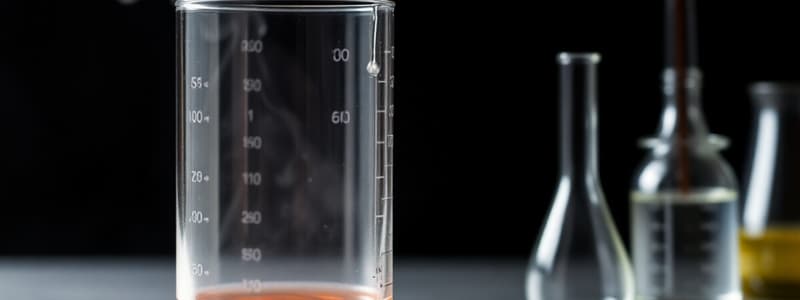Podcast
Questions and Answers
What defines the boiling point of a substance?
What defines the boiling point of a substance?
- The temperature at which a liquid freezes.
- The temperature at which a solid turns to a liquid.
- The temperature at which gas condenses into a liquid.
- The temperature at which a liquid transforms to a gas. (correct)
At what condition does the normal boiling point occur?
At what condition does the normal boiling point occur?
- When liquids are at a temperature of 0 °C.
- At any external pressure.
- When the substance is completely solidified.
- When the vapor pressure equals 1 atmosphere. (correct)
How does increased external pressure affect the boiling point of a liquid?
How does increased external pressure affect the boiling point of a liquid?
- It causes the liquid to freeze.
- It lowers the boiling point significantly.
- It has no effect on the boiling point.
- It raises the boiling point. (correct)
What phenomenon occurs when a non-volatile solute is added to a solvent?
What phenomenon occurs when a non-volatile solute is added to a solvent?
What is boiling point depression primarily caused by?
What is boiling point depression primarily caused by?
Which of the following applications is NOT related to boiling?
Which of the following applications is NOT related to boiling?
What is the boiling point of water at standard atmospheric pressure?
What is the boiling point of water at standard atmospheric pressure?
Boiling point elevation is proportional to what factor?
Boiling point elevation is proportional to what factor?
Flashcards
Boiling Point
Boiling Point
The temperature at which a liquid changes into a gas. It's a characteristic property of a substance. At the boiling point, the vapor pressure of the liquid equals the external pressure.
How does pressure affect boiling point?
How does pressure affect boiling point?
Increased pressure raises the boiling point, while decreased pressure lowers it. This is why water boils at a lower temperature at higher altitudes.
How does the substance itself affect boiling point?
How does the substance itself affect boiling point?
Different substances have different boiling points due to differences in intermolecular forces. Stronger intermolecular forces typically result in higher boiling points.
What effect do impurities have on boiling point?
What effect do impurities have on boiling point?
Signup and view all the flashcards
What is the normal boiling point?
What is the normal boiling point?
Signup and view all the flashcards
What is boiling point elevation?
What is boiling point elevation?
Signup and view all the flashcards
What is boiling point depression?
What is boiling point depression?
Signup and view all the flashcards
What are some applications of boiling point?
What are some applications of boiling point?
Signup and view all the flashcards
Study Notes
Definition of Boiling Point
- Boiling point is the temperature at which a liquid changes to a gas.
- It's a characteristic property of a substance.
- At the boiling point, the vapor pressure of the liquid equals the external pressure.
Factors Affecting Boiling Point
- Pressure: Increased external pressure raises the boiling point; decreased pressure lowers it. This explains why water boils at a lower temperature at higher altitudes.
- Substance: Different substances have different boiling points due to variations in intermolecular forces. Stronger forces typically lead to higher boiling points.
- Impurities: Dissolved substances in a liquid can raise or lower the boiling point, a phenomenon called boiling point elevation or depression.
Normal Boiling Point
- The normal boiling point is the temperature at which a liquid boils at a pressure of 1 atmosphere (standard atmospheric pressure).
- For water, the normal boiling point is 100 °C (212 °F).
Boiling Point Elevation
- Boiling point elevation is the increase in the boiling point of a solvent when a non-volatile solute is added.
- This elevation is proportional to the concentration of the solute.
- The amount of elevation depends on the nature of both the solute and the solvent.
Boiling Point Depression
- Boiling point depression is a phenomenon where the boiling point of a solvent decreases when a non-volatile solute is added.
- This is primarily due to solutes hindering the ease of vaporization.
- It's a colligative property; its magnitude depends on the number of solute particles, not their chemical nature.
Applications of Boiling Point
- Purification: Boiling can be used to separate mixtures based on different boiling points.
- Cooking: Boiling is a common food preparation method.
- Industrial Processes: Boiling is essential in many industrial processes, including chemical production and power generation.
- Scientific Experiments: Boiling is used for experiments concerning phase transitions, chemical reactions, and heat transfer.
- Calibration and Measurement: Standard boiling points are used for calibrating thermometers and other measuring devices.
Studying That Suits You
Use AI to generate personalized quizzes and flashcards to suit your learning preferences.



